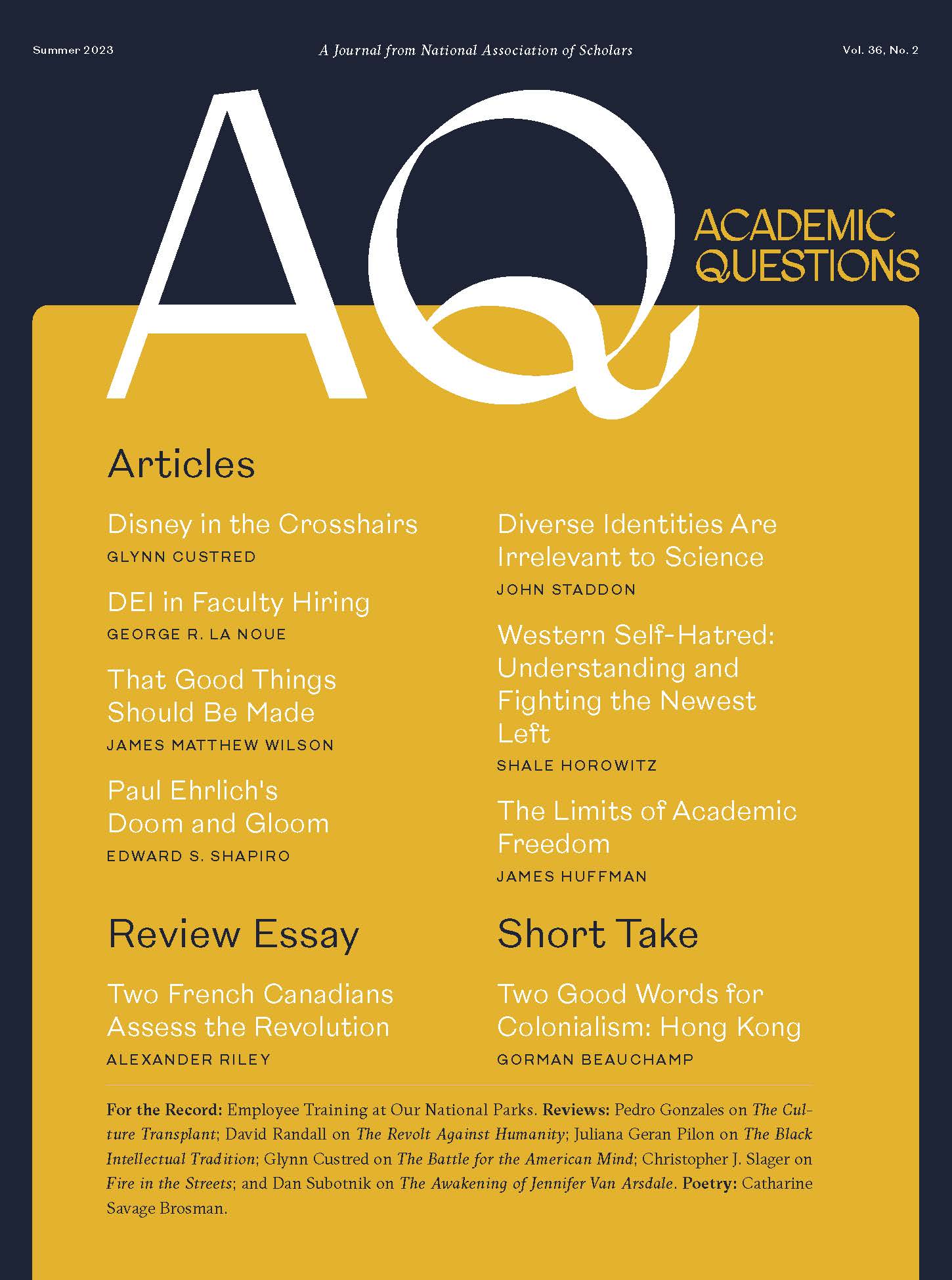One of the most powerful influences in higher education today is the concept of diversity, equity, and inclusion (DEI). Managed by an ever-growing bureaucracy1 and promoting a seductive, though ambiguous, message to this generation of students, DEI continues to grow on campuses. It is estimated that almost one-fifth of all academic positions now require DEI statements to be submitted.2 In the 2021 UC Berkeley hiring season, 679 out of 893 candidates for life sciences positions were rejected for failing initial DEI metrics and did not have their academic credentials evaluated. 3
Of course what gestates on campuses doesn’t stay there. DEI is now a ubiquitous mantra across the country, adopted by corporations, professional associations, scientific funders, publication reviewers, museum collections, award ceremonies, theatrical productions, movie casts and plots, orchestras and their repertoires, among many other industries and institutions.
Who could object to these concepts? Seeing a billboard declaring, “Diversity is our strength” doesn’t really hurt anyone, does it? DEI advocates argue that no good person could support monocultures, inequality or exclusion, so the movement is just promoting “common good” ethics.
Is DEI a Common Good Ethic?
Common good ethics have an ancient lineage going back to Plato, Aristotle, and Cicero with a more recent articulation by John Rawls: “as certain general conditions . . . that are equally to everyone’s advantage.”4 In America, standing with hats in hand to recite the Pledge of Allegiance “with liberty and justice for all” or singing the national anthem honoring “the land of the free and the home of the brave” might be displays of common good ethics. Nevertheless, the Supreme Court found that a state legislature could not require school children to take the Pledge5 and that even burning the flag could be an exercise in free expression.6
Is DEI just an example of common good ethics or does it embody a more ideological or political agenda? As implemented, DEI is increasingly used as a metric for allocation of resources and jobs in ways that hurt some people and groups. Equity does not require equal treatment for all, but intervention by authorities to create equal outcomes among racial, ethnic, gender, and sexual preference groups. Inclusion often results in exclusion of those considered “overrepresented.”
These negative outcomes are difficult to predict since DEI advocates rarely define their terms, even as they seek to impose them on every aspect of an institution. This purposeful ambiguity creates particular problems when DEI commitment is used in faculty hiring and promotion processes. Professorial careers require successfully navigating a series of competitive gateways—graduate school admissions, fellowships, tenure track assistant professorships, peer-reviewed publications, conference participations, and, finally, promotion and tenure. When the guardians of academic gateways use a DEI lens, who will succeed? Career planning becomes ideologically very complicated. Some talented candidates may drop out along the way because of uncertainty over what DEI criteria will mean in evaluating them.
The Chronicle of Higher Education defines diversity as “race, gender, age, sexual orientation, disability, education, socio-economic background, life experience, geography, religion, ideology, and more.”7 Some universities are equally expansive in their diversity aspirations, but when it comes to actually measuring and reporting on diversity, race and gender are the important categories. Reduction in the percentage of employed or enrolled whites is often the unstated priority.8
Research shows that in many academic disciplines ideological or political diversity does not exist. Similar patterns are reflected in the political donations made by faculty and staff.9 Is it plausible to believe that these homogenous partisan identities do not influence concepts of DEI and how hiring and promotion credentials are evaluated? While most campuses have academic freedom statements, they rarely explicitly bar the use of political or ideological considerations in hiring or promotion, so there are few checks and balances in those processes.
DEI as a Partisan Agenda
DEI requirements might be seen as just common good ethical commitments such as rules against research fraud or sexual harassment, but the evidence suggests that in the present era they serve purposes which partisans exploit. The day after President Biden’s inaugural address stressing national unity, he signed more than thirty executive orders including an “Executive Order on Advancing Racial Equity and Support for Underserved Communities Through the Federal Government” (#13985). On June 25, 2023, he signed a similar executive order expanding the equity mandate to the operation of every federal program. ("Executive Order on Diversity, Equity, Inclusion, and Accessibility in the Federal Workforce.” #14035).10 As with most Executive Orders issued by presidents, there was no public regulatory comment process, no legislative hearings, and no Congressional consent. As Vice President Kamala Harris explained on the campaign trail there is a big difference between equal treatment of individuals and group equity. Under equity she suggested, “we all end up in the same place.”
In short, the Biden Executive Orders, along with myriad federal, state, and local policies, utilize governmental power to reallocate tax revenues, employment, contracts, debt relief, housing, transportation, and college admissions to rectify racial disparities. In the name of equity, and given the current political configuration among racial groups in the U.S., resources will be moved to groups more closely identified with Democrats and taken away from groups more closely aligned with Republicans. Equity becomes a form of reparations without using that politically unpopular term.
This equity concept was evident in the administration’s American Rescue Plan Covid relief policy placing white male owned restaurateurs at the back of the line for loans and excluding white farmers and ranchers from USDA debt relief altogether. Federal courts all over the country overturned these provisions finding they were not compatible with constitutional equal protection. The Biden Department of Justice decided not to take the risky step of appealing these decisions.11 What if a faculty candidate is asked what he or she thought about ARPA preferences or those in admissions policies before the Supreme Court? Would even well-reasoned opposition to preferences be a fatal response according to DEI concepts?
Resistance to DEI in Faculty Hiring
DEI hiring requirements have been criticized by the Academic Freedom Alliance, the American Council of Alumni and Trustees, the Foundation for Individual Rights in Expression, the National Association of Scholars, and Speech First because they require ideological commitment to a set of complex and highly disputed policies.
Now empirical evidence has been discovered about how some search committees use DEI criteria in hiring evaluations. A FOIA request for DEI evaluations for professorial candidates in biology at Texas Tech University revealed just how idiosyncratic and ideological those considerations can be.12 Texas Governor Abbott then instructed all public campuses that DEI hiring requirements might violate “federal and state employment laws.”13 According to the Chronicle’s “DEI Legislation Tracker,” anti-DEI bills for higher education have been introduced by Republicans in thirteen states,14 most notably Florida, where officials have eliminated DEI bureaucracies and DEI employment requirements from state campuses.15 Over the opposition of the Ohio State Board of Trustees and several outspoken campus presidents, Ohio has passed legislation restricting DEI and requiring other forms of accountability.16 North Dakota17 and Idaho18 have barred the use of DEI affirmations in campus hiring. After criticism by Republican state legislators, the President of the University of Wisconsin (UW) System ended the use of DEI employment tests saying, “Regardless of their form, this [DEI] practice may be perceived as a litmus test. And as a result, some people may simply not apply. We have to be inclusive, and that means inclusive of everyone, including people with varying political ideologies and perspectives.”19
There may have been an earlier period when phrases like diversity, equity, and inclusion were just common good ethical aspirations. In the current world of an increasingly partisan faculty and a political culture that disagrees about both the definition and implementation of DEI concepts, campus DEI hiring requirements cannot avoid being ensnared in these conflicts.
While the political response to general DEI initiatives will vary in red and blue states, two things are probably necessary to control their use as faculty loyalty oaths or as covers for identity-based hiring. First, state university systems and campuses should create policies forbidding the use of all ideological or political tests in hiring or promotion. The Board of Governors of the University of North Carolina has just adopted such a rule.20 Second, litigation will be necessary to determine when DEI hiring requirements violate First Amendment rights prohibiting compelled speech and Fourteenth Amendment requirements of equal protection.21 Daniel Ortner, now a lead litigator for F.I.R.E, has laid out the case for such a legal challenge.22 On April 25, National Association of Scholars sponsored a webinar with litigators from around the country to explore how such litigation could be brought.23 A month later, the Pacific Legal Foundation sued the University of California, Santa Cruz on behalf of an applicant for a Psychology position who would be required to affirm DEI.24
Without these continuing efforts it is likely the imposition of DEI will further crush the diversity of political opinion in academic life and widen the partisan gap in support for higher education.
George R. La Noue is Emeritus Professor of Public Policy and Political Science at the University of Maryland Baltimore County; [email protected]. He is the author of Silenced Stages: The Loss of Academic Freedom and Campus Policy Debates (Carolina Academic Press, 2019). La Noue last appeared in AQ with “Courts versus Campuses: The Struggle to Protect Free Speech” in the Winter 2022 issue.
1 Jay P. Greene, James D. Paul, “Diversity University: DEI Bloat in the Academy,” Center for Education Policy, July 27, 2021. https:// www.heritage.org/sites/default/files/2021-07/BG3641-o. pdf.) In a survey of sixty-five universities in the “power five” athletic conferences, the authors found there were about three-thousand persons with DEI responsibilities in these institutions.
2 James D. Paul, Robert Maranto, “Other Than Merit: The Prevalence of Diversity, Equity and Inclusion Statements in University Hiring,” American Enterprise Institute, November 2021.
3 Amma Khalid, Jeffrey Aaron Snyder, “How to Fix Diversity and Equity: Ritualized regimes of political expression must be rejected,” The Chronicle of Higher Education, May 27, 2021.
4 Manuel Velasquez et al. “The Common Good,” Markkula Center for Applied Ethics, August 2, 2014.
5 West Virginia v. Barnette, 1943.
6 Texas v. Johnson, 1989.
7 “DEI Commitment Statement,” January 6, 2023. However, when The Chronicle reports on student and faculty “diversity” only race, ethnicity, and sex are recorded. “How Diverse Are Student Populations on College Campuses,” May 15, 2023. Few campuses measure other “diversity” characteristics.
8 Colleen Flaherty, “Faculties So White,” Inside Higher Education, December 2, 2022.
9 Mitchell Langbert, Sean Stevens, “Partisan Registration and Contributions of Faculty in Flagship Colleges,” Academic Questions, January 17, 2020.
10 Republished in Academic Questions. “Presidential Executive Orders Concerning Critical Race Theory,” 34, no.3 (Fall 2021), DOI:10.51845/34.3.27
11 George R. La Noue, “The Race Card in ARPA’s Food Supply Deck,” The Federalist Society Review, 22 (2021).
12 John D. Sailer, “Exclusive Documents: At Texas Tech, Job Candidates Punished for ‘Microagressions,’ Rewarded for ‘Land Acknowledgement,’” NAS, February 7, 2023.
13 Kate McGee, “Texas Tech reviews its hiring practices as efforts to promote diversity come under fire,” The Texas Tribune, February 8, 2023.
14 “Explore where college DEI efforts are under attack,” Chronicle of Higher Education, March 9, 2023.
15 “Legislative Victory for Florida Higher Education,” National Association of Scholars, May 17, 2023.
16 Josh Moody, “Ohio State Board Pushed Back on Anti-DEI Bill.” Inside Higher Education, May 18, 2023.
17 Kate Marijolvic, “North Dakota Just Enacted a ‘Specific Concepts’ Bill. Here’s What it Says.” The Chronicle of Higher Education, April 25, 2023.
18 Kevin Richert, “Idaho State Board of Education bans ‘diversity’ statements from higher education job market,” Idaho Capital Sun, April 26, 2023.
19 “Entire University System to No Longer Require ‘Diversity Statements’ From Applicants,” Daily Caller, May 5, 2023.
20 Ari Blaff, “UNC-Chapel Hill Drops DEI Hiring Requirement amid Growing Backlash,” National Review, February 25, 2023.
21 Christopher F. Rufo. Ilya Shapiro, Matt Beienburg, “Abolish DEI Bureaucracies and Restore Colorblind Equality to Public Universities,” Issue Brief, Manhattan Institute, January 18, 2023.
22 Daniel M. Ortner, “In the Name Of Diversity: Why Mandatory Diversity Statements Violate the First Amendment and Reduce Intellectual Diversity in Academia, Catholic University Law Review, 70, no. 4 (2021).
23 For a related publicly available webinar see National Association of Scholars, “VIDEO: Race in Higher Education: Persecuting Dissent,” April 25, 2023, https://www.nas.org/blogs/media/video-race-in-higher-education-persecuting-dissent
24 Haltigan. v. Drake, Complaint, 5.28-cv2437. May 18, 2023.














